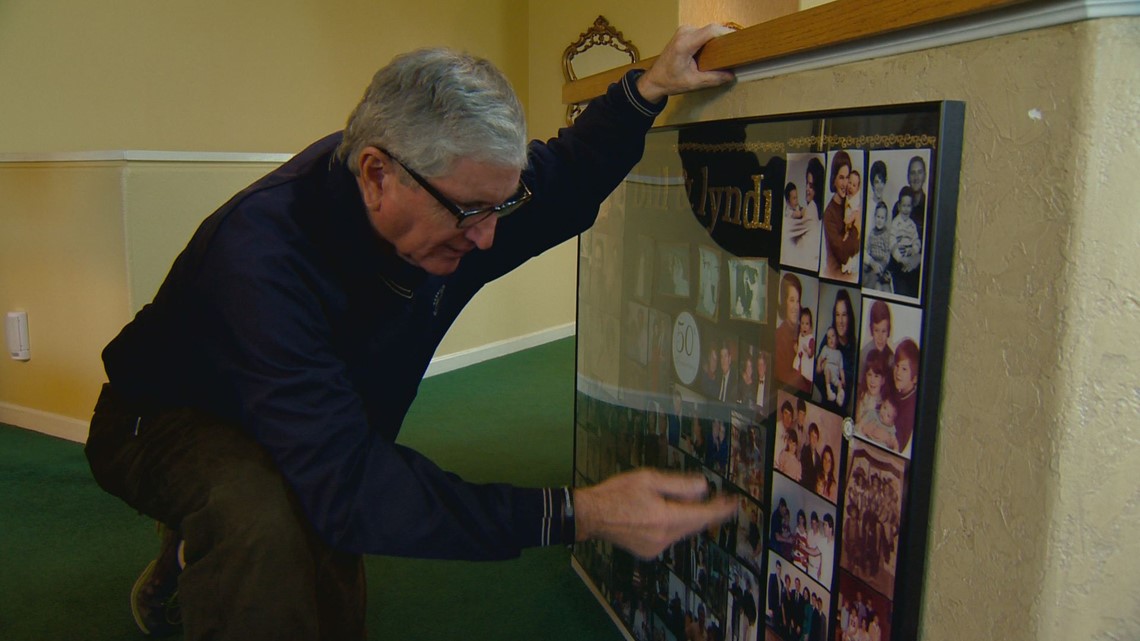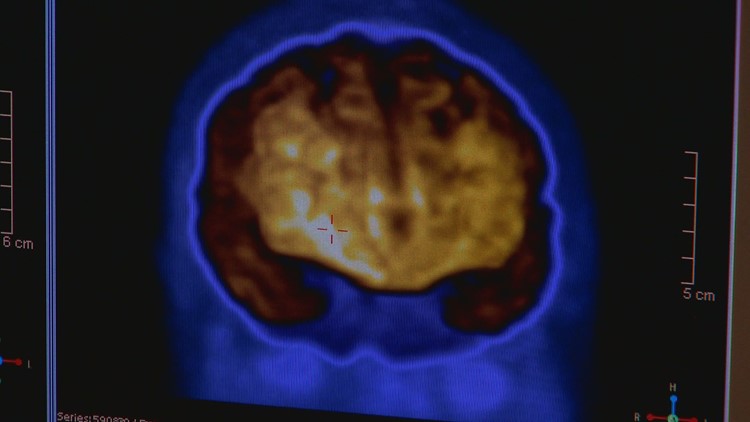
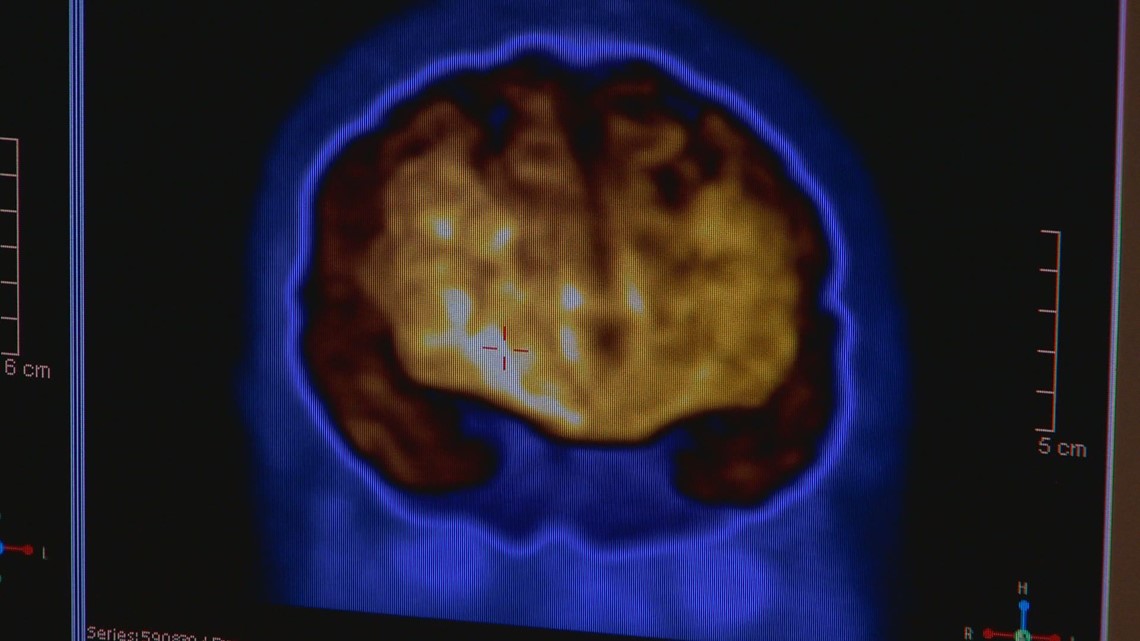
CHAPTER 1
After 190 failures, could No. 191 be the silver bullet?9NEWS is looking at some highly-promising Alzheimer’s research at the CU Anschutz Medical Campus.A team of doctors there are conducting studies on a drug that could be the first in a new "class" of medications that could actually reverse the course of the disease.
9NEWS Senior Source Correspondent Mark Koebrich says researchers are facing difficult odds.
One hundred and ninety other drugs for the treatment of Alzheimers have already failed in medical trials. But this one—called Leukine -- is beginning to show encouraging results.The question is, will Leukine -- which becomes drug No. 191 -- prove to be the "silver bullet?”
"We don't know. That's why we have to do this study," says Dr. Huntington Potter, the director of Alzheimer’s research at CU Anschutz.A safety trial on the drug already underway on the CU Anschutz Medical Campus has so far meet all hopes.
"We found so far that Leukine is safe in people with Alzheimer’s disease," Potter said. "That means that it doesn't have the side effects that so many other Alzheimer’s drugs have had, which are swelling in the brain and bleeding into the brain."Potter and his team say a successful Alzheimer’s drug must first perform the complex task of removing the plaque or amyloid that causes Alzheimer’s from the outside of nerve cells in the brain.
Leukine has been shown to do that in mice with Alzheimer’s -- and in a very efficient fashion.
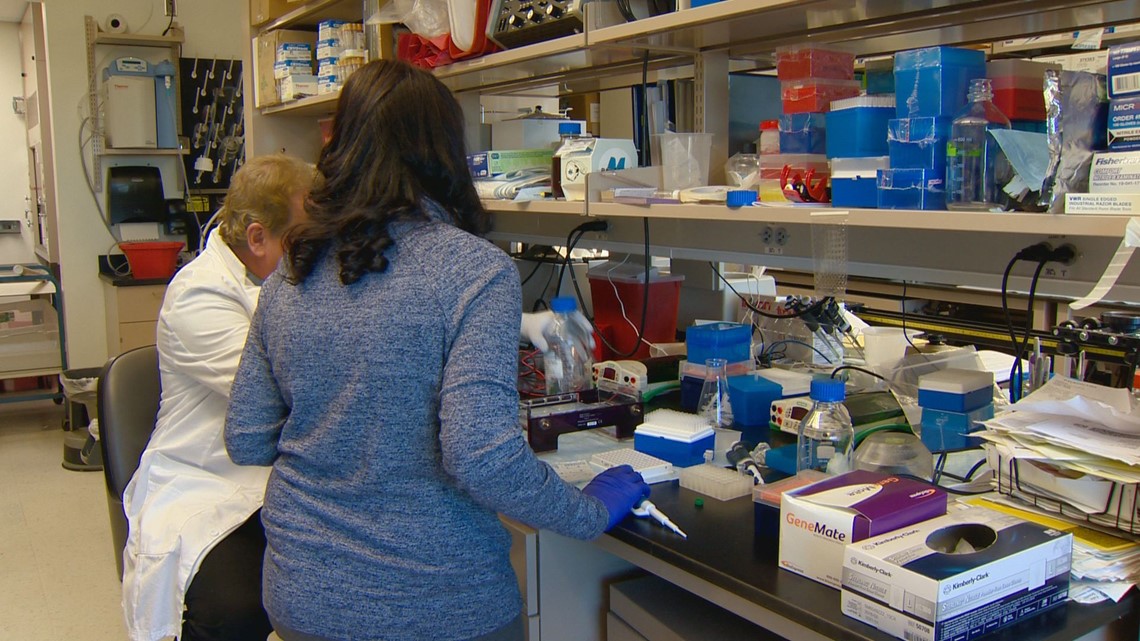
Dr.Timothy Boyd, a member of Potter's research team, showed us a picture of a mouse brain with the tell-tale amyloid deposits.
The left side of the brain has far fewer deposits than the right after only one injection of Leukine."In seven days, that one injection removed about half the plaque -- all these little white spots--from that side of the brain versus this side of the brain," Boyd said. "It gets rid of them. We don't know the exact mechanism.
“There might be several mechanisms behind how it gets rid of them. We have lots of good hypotheses about how that might be happening. But the main fact is that they are being removed, and very quickly."In fact, Potter says, that's the fastest, most effective amyloid or plaque-reducing molecule anyone has ever seen.
IMAGE CAPTION: Researchers are using mice to assess how well the drug Leukine works for curing Alzheimer's disease.
And, in a second major hurdle, says another member of the research team, the drug removed the plaque without causing other significant damage."When we target amyloid in the brain, when it is removed by these different drugs … the removal sometimes triggers changes in the brain such as small hemorrhages or swelling or edema in the brain which can result in quite a bit of cognitive difficulty," Dr. Jonathan Woodcock said.

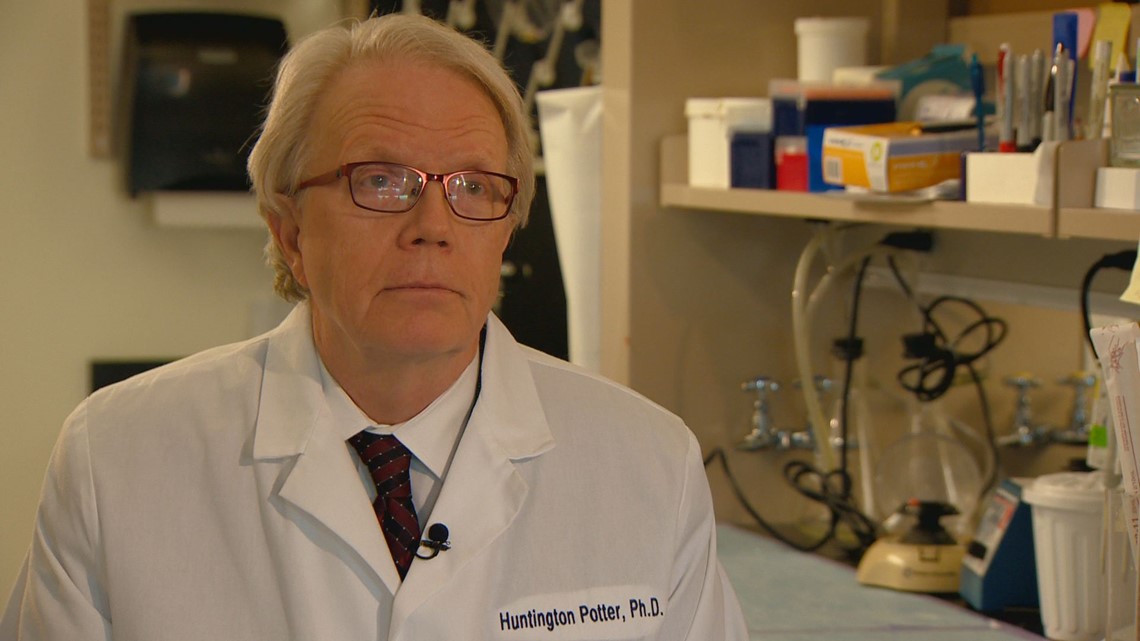
Leukine did none of that damage.
"We have not found any evidence of that and we're specifically looking for it,” Boyd said. “We're doing MRI's on the subjects that received the drug, and there's been no evidence yet to show that this would happen.”Even more remarkably?
"It seems Leukine may do more than that,” Potter said. “Not only get rid of the amyloid deposits which are damaging in the brain, but actually help the brain repair itself."That means this may be a drug that dissolves the plaques, does no damage in the process, and helps the brain make the necessary repairs to restore cognition, the cognition that Alzheimer’s robs from all of its victims.
"We're very excited about that," Dr. Boyd said.So is the Alzheimer's Association, which is giving Potter $1 million to begin the next phase of his trial.
Director of Marketing and Communication Jim Herlihy says, a drug that works can't arrive soon enough."We're looking at a 37 percent increase in Alzheimer’s in Colorado between now and 2025,” Herlihy said. “We'll have more than enough people to fill Mile High stadium, and that's not a good thing.”

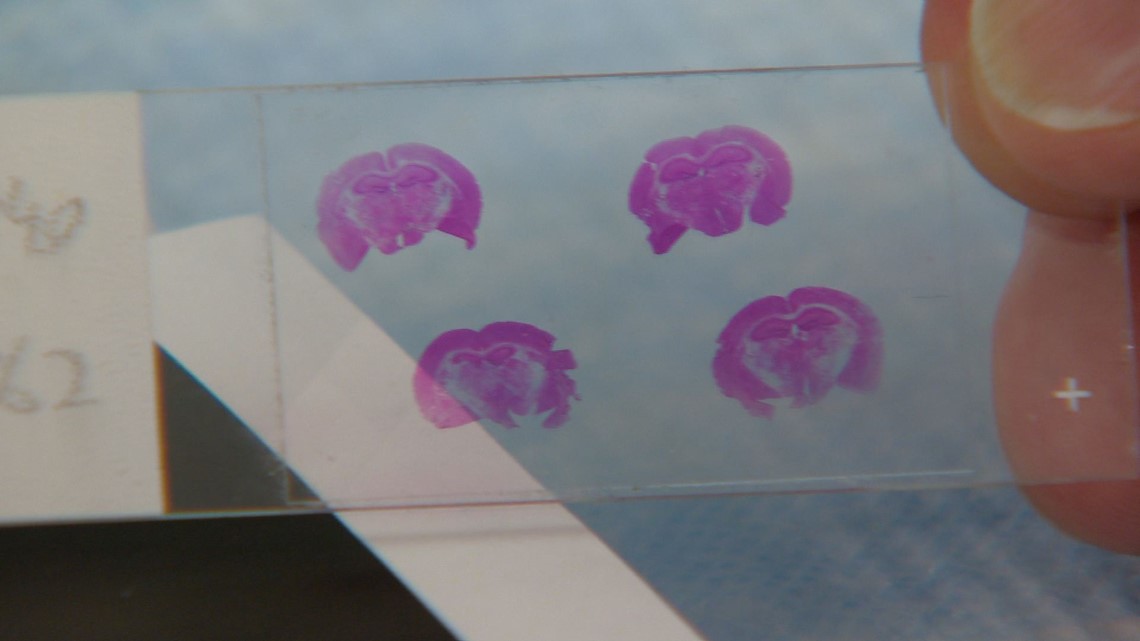
Potter knows millions will be awaiting an outcome. Like all of us-- he has his fingers crossed.
"We are cautiously optimistic,” he said. “We wouldn't carry out this trail if we didn't think it had promise. But the history and science in general tell us to only be cautious."You may be wondering, if the trials are a success, how long would it be before Leukine is available to Alzheimers patients.
The facts are, Leukine has been around since 1991 as a treatment for patients receiving bone marrow transplants. It has been administered successfully to half-a-million patients and already has FDA approval. That means it could get the fast-track for treatment in Alzheimer’s patients, which may be as soon as two years from now.Leukine is al
so being looked at as a drug for Parkinson's disease.CHAPTER 2WHAT CAN YOU DO TO PREVENT ALZHEIMER'S?
A research team at CU Anschutz in Aurora is conducting trials on a drug that may be the first truly effective treatment for Alzheimer’s. But even if they are successful, it will be least another two years before the drug is released for use by Alzheimer’s patients.

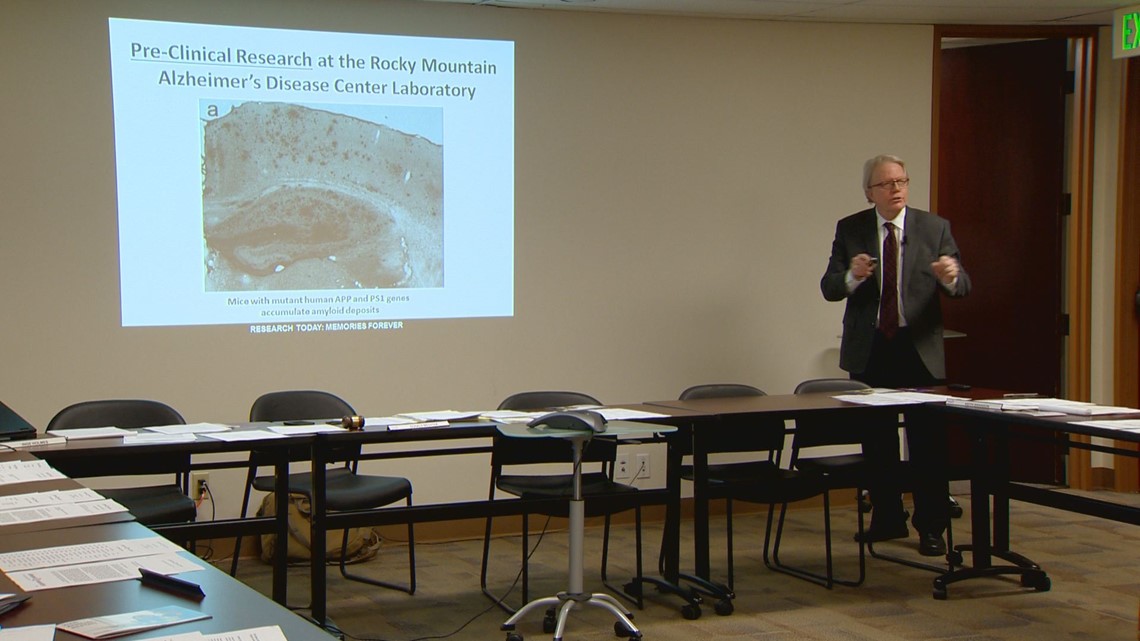
9NEWS Senior Source Correspondent Mark Koebrich says there are some lifestyle changes you can make now to perhaps lessen the impact of Alzheimer’s-or- delay the onset of the disease altogether.
Medical professionals and health workers say the need for an effective Alzheimer’s treatment cannot be overstated."The message is we need to find a cure for this disease because it will be financially debilitating for the health care system," says Jim Herlihy of the Colorado Alzheimer’s Association.
In the U.S., we currently spend one out of every five Medicare dollars on the care of Alzheimer’s patients. In fewer than 35 years, if no treatment is found, we could be spending one out of every three."We estimate right now that there's 5.4 million Americans with Alzheimer’s disease. In Colorado it's 67,000," Herlihy said. "The big challenge with that is that a lot of people dealing with Alzheimer’s or the symptoms of Alzheimer’s, don't know that they have it."

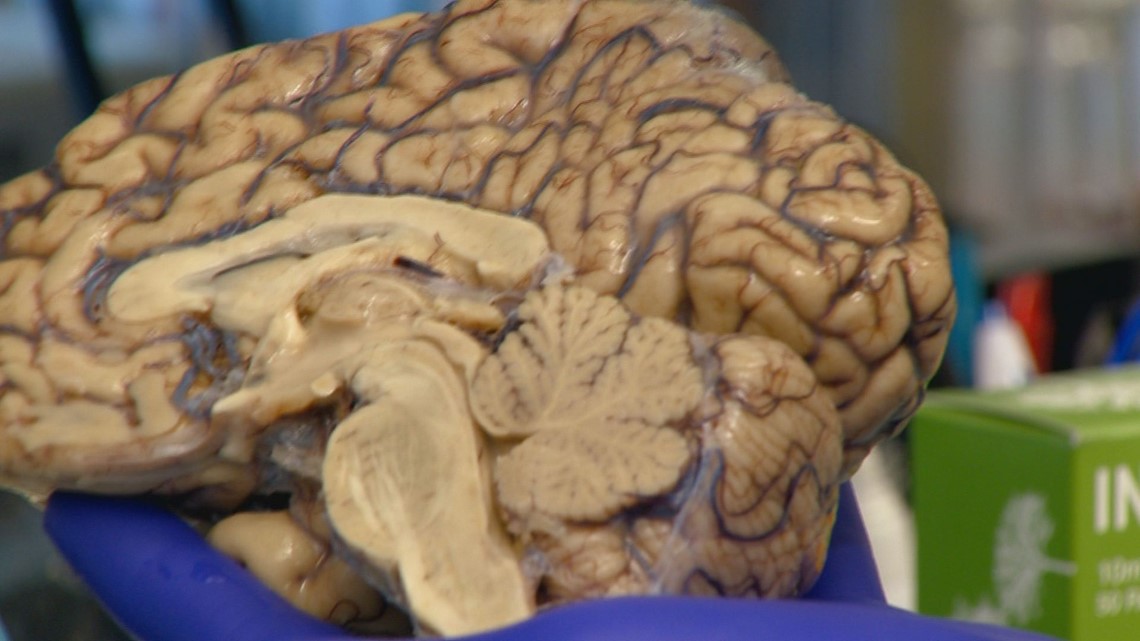
A team of researchers at CU Anschutz is on mission to find those people and a treatment to prevent Alzheimer’s from ruining their lives.
They are presently testing a drug called Leukine that is showing great promise.It dissolves the "amyloids" or plaques that form on the brain that cause Alzheimer’s. The early evidence is it does so without any apparent side effects. That's groundbreaking news, since 190 other drugs designed to do the same failed.
"The reason the others failed is not really known," Dr. Huntington Potter, the director of Alzheimer’s research at CU Anschutz, said. "But one of the problems is that they only attack Alzheimer’s disease in one or a few ways. It's seems that Leukine may do more than that. Not only get rid of the amyloid deposits which are damaging in the brain, but actually help the brain repair itself."
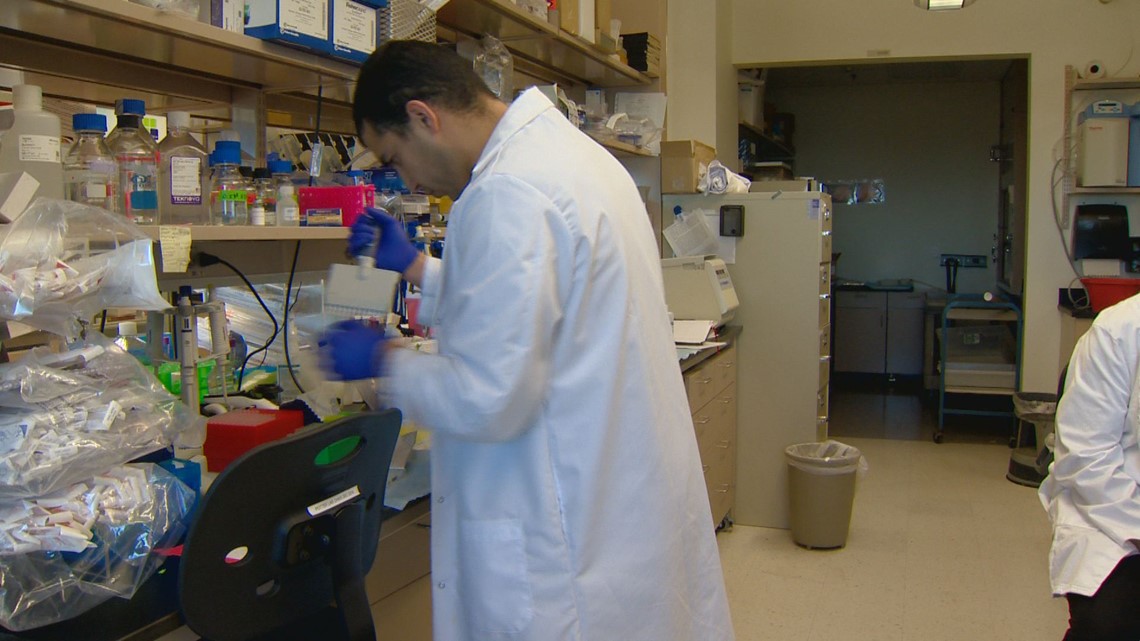
But even if successful, Potter says, we are still years away from approval. Also, he says Leukine is expensive.
"We would predict that it might cost $100,000 a year to treat somebody with Luekine for Alzheimers disease."
So is there something we can do for ourselves "now" to promote brain health, while we are waiting for a cure to arrive?
"We do know that there are important things that people can do throughout their life for brain health," says Dr. Jonathan Woodcock, who is the clinical director of the University of Colorado Hospital's Memory Disorders Clinic.
Woodcock says the lifestyle choices people make can not only make a difference in the probability that they will get Alzheimer’s disease, but also, "when" they will get it.
He says there are some common sense practices to follow:
EXERCISE
"So if you want to delay the onset of the time that you might get Alzheimer’s disease, then the best thing to do is to take care of your brain very well,” Woodcock said. “That means to avoid contact sports that produce concussions and brain injuries and head injuries."
Woodcock also says, as you might have guessed, staying fit is very important.
"Staying in good shape physically is probably the most helpful thing that we can do preventatively," he said.
And, Potter adds, this means not just taking a passing interest in fitness or doing the exercise that's easy.
"A little bit of walking around the block isn't going to do it," Potter said. "And that's what makes intervening with Alzheimer’s disease so difficult. Because even for something like heart disease where the data are very,very clear that exercise is helpful, people have a lot of trouble keeping up."
EAT WELL
Also, a good diet is extremely important.
Eating well and avoiding especially refined sugars is the recommended course of action. The usual advice of including a lot of fruits and vegetables also applies. And then, there's the practice of remaining in touch with your fellow human beings.
The brain, as it turns out, loves to visit. And it also loves mental challenges. Learning a new language or learning how to play a musical instrument is excellent for the brain. The more difficult and stimulating, the better.
"Unfortunately," Woodcock said, "these things are not either completely preventative or completely curative. But they both extend the period of useful activity and meaningful activity and help to slow down the disease process."
DRINK COFFEE
But here's a preventative practice that is easy, and is one you might not have expected. If you have a big coffee habit, the caffeine, Potter said, may be your best friend.
"That's what the data say. Three to five cups of coffee a day, in middle age, reduces the risk about 60 percent, and certainly our animal models of Alzheimer’s are completely cured by treatment with caffeine,” he said.
That's right. Heavily caffeinated research mice were actually cured of their Alzheimer’s, although, again, doctors warn ALL of these prevention tips can help, but won't guarantee you won't get Alzheimer’s.
But if you do, we may be closer than ever to an effective Alzheimer's treatment, and it may be found right here in Colorado.

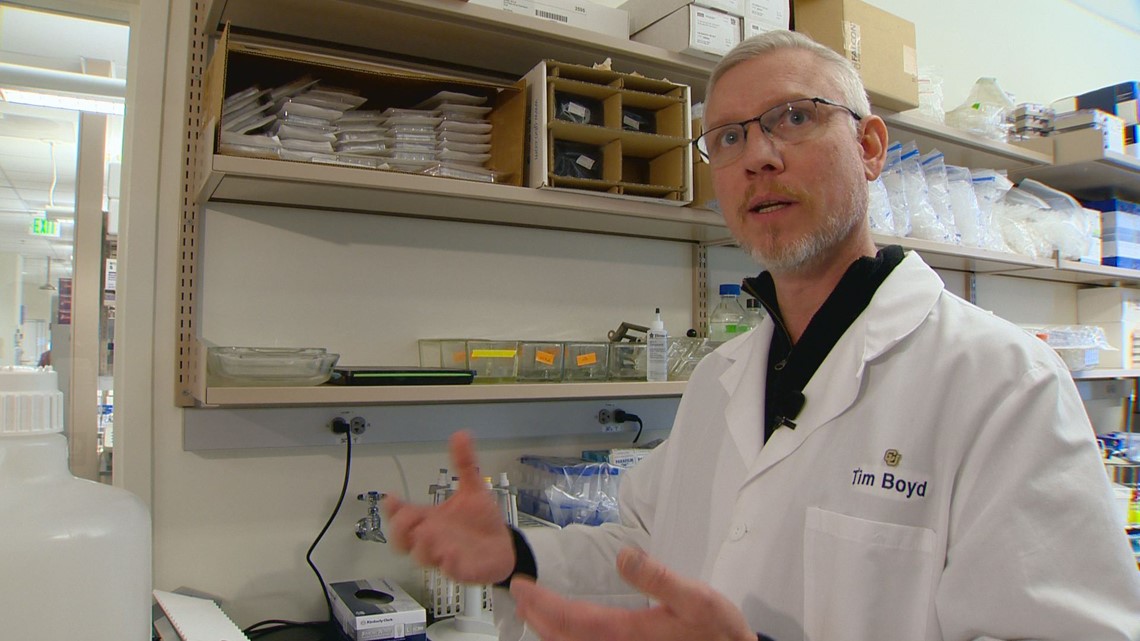
"We're very hopeful," Woodcock said. "In science, we find our hopefulness to be tempered by the reality, in fact by several realities. One is that these issues are very, very complicated. Many attempts have been made to alter the course and to prevent Alzheimer’s disease that have already failed. And we need to keep that mind."
Doctors say if Leukine, or any other drugs, do prove to be successful, a patient would probably need to be treated with them for the rest of their natural lives to keep the disease in check.
But again, while we wait for a treatment, the four best things you can do to help yourself are getting enough sleep, remaining social, getting enough exercise and drinking caffeinated coffee.
CHAPTER 3
BILL MCCARTNEY TALKS ABOUT LIFE WITH ALZHEIMER'S
We spoke to one of the participants in the CU Anschutz Medical Campus’ trial of Leukine.
Bill McCartney is a familiar face in Colorado. He's a sports icon, and a man of deep faith and strong convictions. He wants everyone to know that even though he has Alzheimer’s, he's in it to win it.

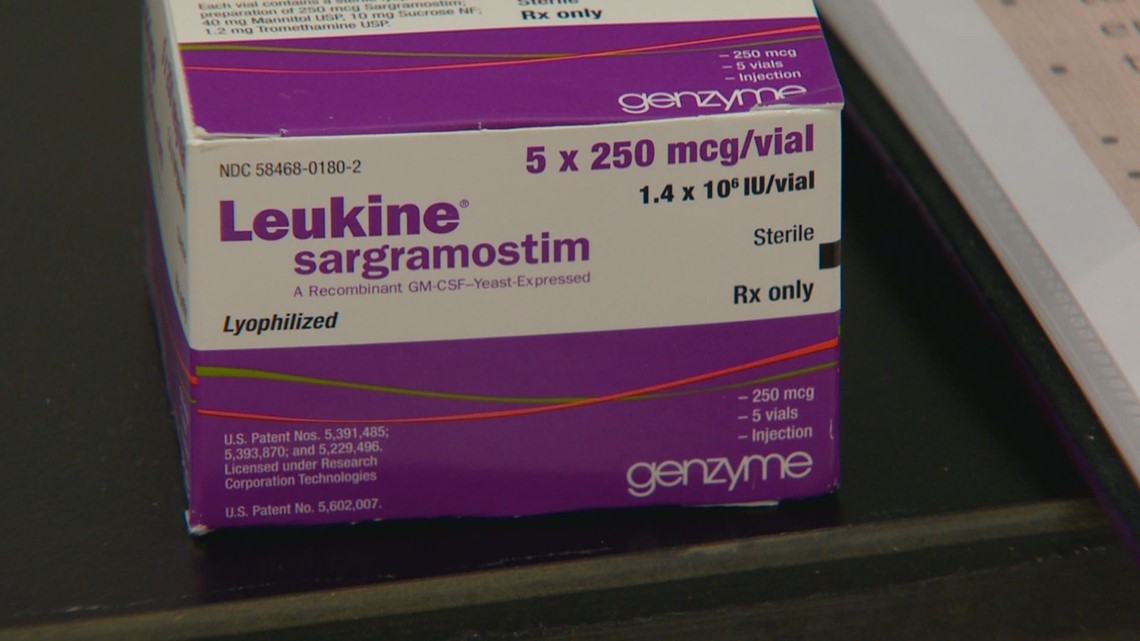
At age 76, McCartney still sparkles with personality and passion.
When we begin our conversation, I tell him, "You’re basically the same guy I met 30 years ago. Better looking, but 30 years ago, you're still the same guy."
"You’re welcome back anytime you want to come,” he fires back with a smile.
What I said is true. Despite his diagnosis, McCartney is still very much the same guy who roamed the sidelines for the CU Buffs in the early 90's, a feat he attributes to a lifetime of regular exercise.
I remind him that many of his former players still think he was a little "too fascinated" with exercise.
McCartney laughs again and points out his teams were always in great shape. When I told him some of his former players had told 9NEWS that Bill McCartney liked to "run his players to death," McCartney laughs even harder, spreads his arm and says, "Well, they're still alive!"
I've decided if any us has the misfortune of contracting Alzheimer’s disease, we'll want the same kind Bill McCartney has. He is completely charming, and as full of family, faith, football, and fight as he ever was.
"The older you get, the opponent becomes more intimidating," McCartney said.
But, he adds, "It's all in the way we look at things. My mom lived to be 103, my dad lived to be 87 so I just figure you play your best football in the fourth quarter. I'm getting ready to bring my A-game.”
McCartney is involved in a series of trials underway on the CU Anschutz Medical campus, trials that could put researchers here at the center of the medical universe. They are looking at a drug called "Leukine" which potentially could become the first in a class of drugs that might finally treat Alzheimer’s disease.
McCartney has dazzled everyone, most especially his doctors, who spent considerable amounts of time with McCartney during the early Leukine trials. Woodcock, part of the CU Anschutz Alzheimers research team, is among McCartney's new admirers.
"As a neurologist, I get to meet a lot of interesting people, and I get to meet them very intimately,” Woodcock said. "And that's a wonderful privilege. Getting to know Coach McCartney has been one of those privileges. He's an extraordinary man. The focus and energy he brings with him to every interaction has not been diminished by the development of this disease process, and it's been wonderful to get to know him and to see how he is using all of the abilities and strengths of his personality in facing this challenge."

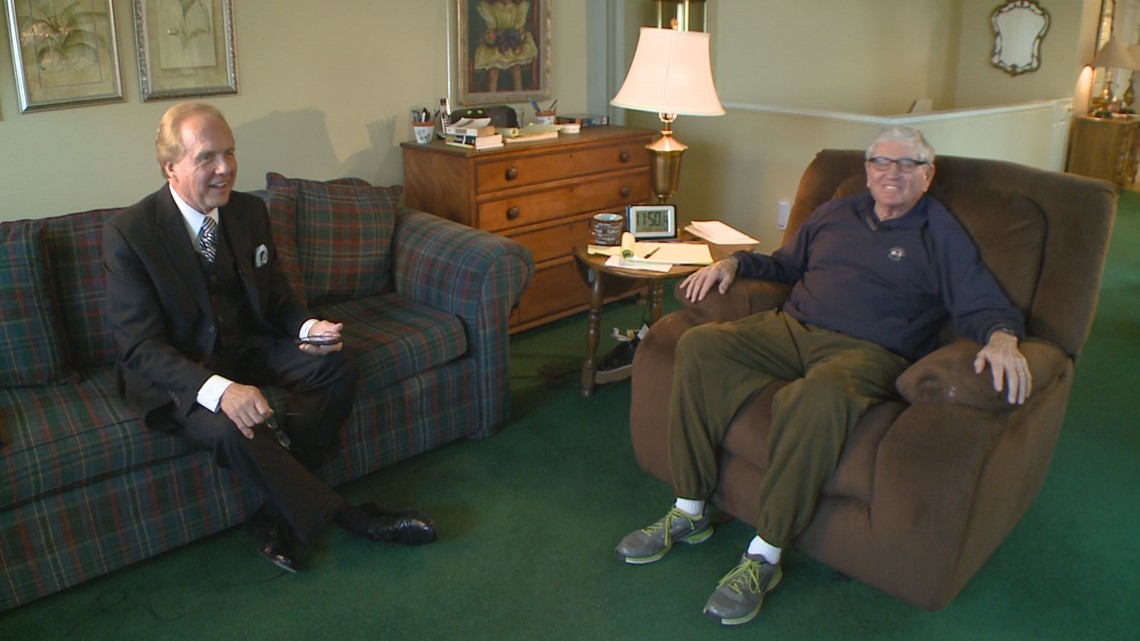
McCartney still loves everything about CU, and is happy to have his name attached to any project they are involved in. He says his experience with the drug trials at CU Anschutz were a little intimidating at first, especially given his condition, but like everything else with the university’s name on it, he was eventually completely impressed.
"I was intimidated. You know one out of one die, and you don’t know when your clock is done ticking, so the fact that I needed to go and be subjected to that, it really called out my hold card,” he said. “But Anschutz, just the name Anschutz, means excellence. It doesn’t get any better than Anschutz in my opinion you know. And so I trust them, but I was fearful. I don't want to go. It's too early."
McCartney says his strength comes from his faith. He still reads the Bible every day and is ready for whatever life hands him next.

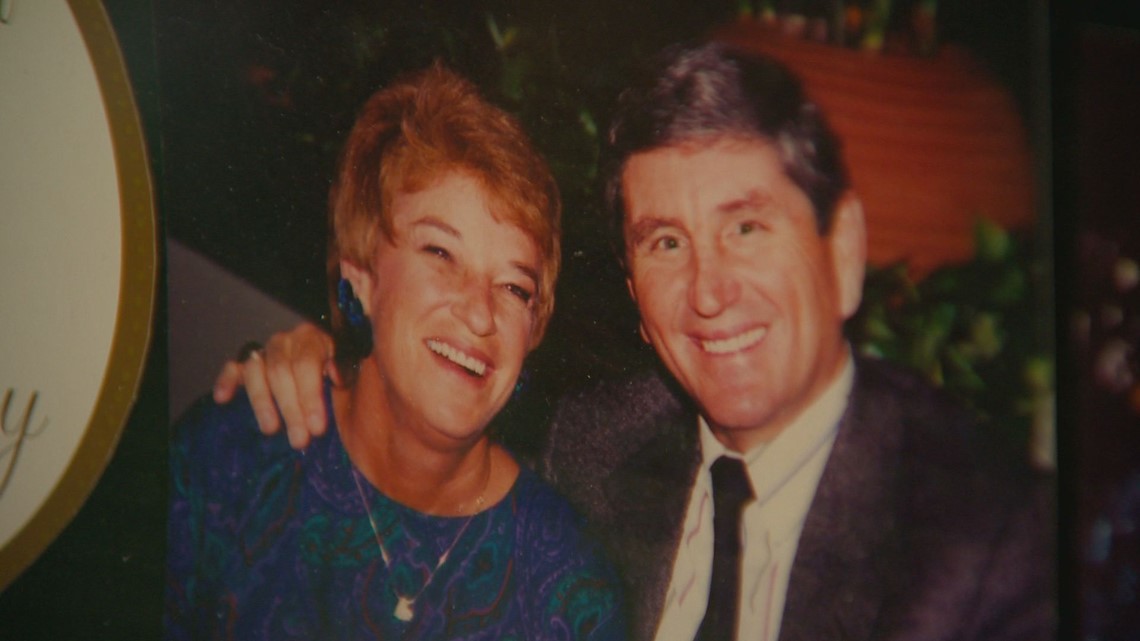
"I know in my heart that I’m going to spend eternity in heaven,” he said. “I know in my heart that I am. Not that I’ve done anything to deserve it.
"So with that, I'm not scared of the future, I'm not scared of growing old. This is all preparation for what's really amazing around the corner."
He even credits the Almighty with, well, delivering a little extra attention when he most needed it. You may remember the Miracle in Michigan back in 1994, when McCartney's Buffs beat the Michigan Wolverines with only seconds remaining.
McCartney, in his typical animated fashion, remembers it this way.
"There’s six seconds to go in the game. We’re trailing 26-21, and a guy stands up and you know there’s a little break in the action, and this is a true story, a guy stands up and yells, you know how a crowd will get quiet before the last play, and that’s what happened and this guy said, ‘McCartney--where’s your God now!’ That’s true story. And on the next play, our God showed up,” says the coach, laughing and holding his hands above his head to illustrate a touchdown.
CU beat Michigan on a Kordell Stewart Hail Mary caught by Michael Westbrook.
He still holds his players close.

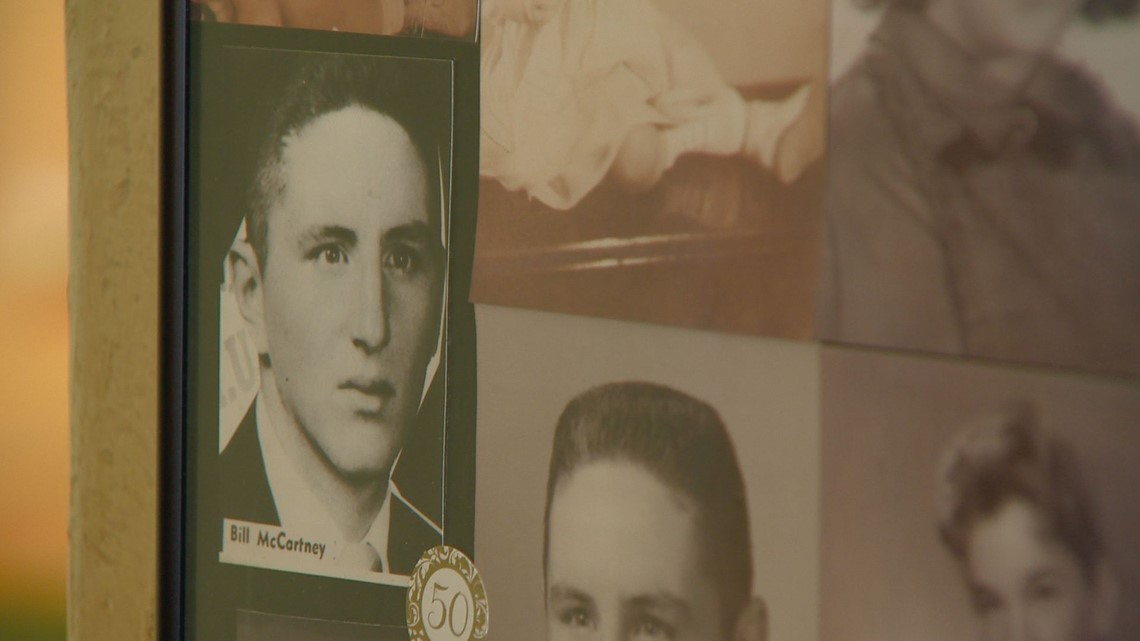
"It’s an amazing friendship that we have. And when I see these guys and I haven’t seen -- maybe I hadn’t seen that guy in quite a while -- you know what happens? We hug! We embrace. It’s me!" he says smiling broadly again. "I’m doing it! I’m not saying they are. But it’s because I carry them in my heart."
In his home, there are a few memories of his days at CU. But far more prominent are the memories of family. His wife Lyndi passed away three years ago. He misses her most of all.
"Look at this one here," he says pointing to an old family photo." "O.K., there’s all four of our kids when they were just up and coming. You know, three boys and a daughter and a goofy guy and a beautiful girl. How did that happen? You know, I think about it. She (Lyndi) lost a bet. She flipped a coin and lost."
McCartney will tell anyone who will listen that he believes his wife was perfect in every way, and that life without her is difficult.
McCartney's son Tom is the football coach at Fairview High School in Boulder. He says his father speaks of his mother often, and still retains many strong memories of family and growing up. In fact, McCartney says his father is so high-functioning, he often forgets he's ill, or that others know that he's ill.


"I might ask my dad, 'Hey dad how are you doing?'” the younger McCartney said. "He says, 'You know, they tell me I've been diagnosed with dementia.' I say, 'yes, dad I know.' He says, 'you know?' He's just so surprised that I would know. So we definitely have seen where we have to have patience."
McCartney says, even as a young man, patience was not his strongest virtue. Even now he is pushing to fill every day with kids and grandkids, and memories of a life well-lived. And of course, for as long as his resilient memory will accommodate it, there is his beloved University of Colorado.
"When I was 7-years-old I knew I was going to be a coach, O.K., and I’m still coaching. They just don’t listen to me anymore. I don’t have access or entry. But if they ever call me up," McCartney says with a sly grin, "I’ll tell them what to do!"
McCartney will continue to be a participant in the Leukine drug trials at CU Anschutz, which will go forward for at least the next two years. He says his memory may be a little suspect these days, but he is as dedicated as ever to CU, dedicated to helping as a subject in the trails, and anxious for Leukine to succeed.
HELPFUL LINKS
- Rocky Mountain Alzheimer’s Disease Center at CU Anschutz: http://bit.ly/2lNmNBO
- Colorado Alzheimer’s Association: http://bit.ly/10B1uWp
- Alzheimer’s Helpline: 1-800-272-3900 (24/7)
- Facts and figures on Alzheimer’s disease from the National Alzheimer’s Association: http://bit.ly/1SJRDkA
- The War on Alzheimer’s: http://bit.ly/159FBid
- The 9 Dimensions of Wellness: http://bit.ly/1WGhHUr
- The six pillars of Alzheimer’s health: How to help yourself: http://bit.ly/2mfMuvC
- Advice on maintaining brain health from the Alzheimer’s Association: http://bit.ly/2li2Rni

